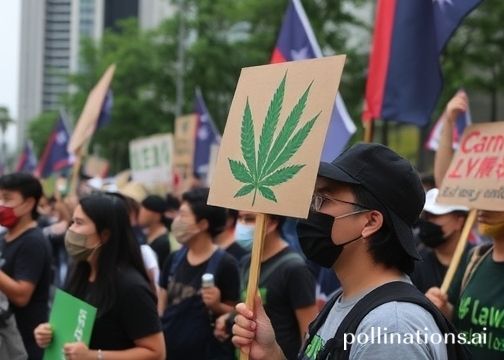Taiwan's Cannabis Advocates Demand End to "War on Weed"
Advocates Rally for Decriminalization and Policy Reform, Challenging Current Laws

Taipei, Taiwan - April 20: The Taiwan Weed Safety Education Association (TWSEA) staged a rally outside the Legislative Yuan on Saturday, advocating for the decriminalization of cannabis in Taiwan. The civil society group urged the government to end its "war" on marijuana, calling for significant policy changes.
The event, dubbed "2025 Green Sensation," saw TWSEA appealing to lawmakers and President Lai Ching-te (賴清德). The group's promotional materials emphasized the need to "eliminate the stigma against marijuana and discriminatory policies against the marijuana community."

The TWSEA is pushing for several key reforms, including relaxing the permissible levels of tetrahydrocannabinol (THC), aligning cannabis policy with international standards, and removing cannabis from government-led anti-drug campaigns.
The rally, which began at midday, featured musical performances from jazz band Soul Heist and rock band Chillsome. A march through Taipei's Zhongzheng District commenced at 4:20 p.m., according to the TWSEA's schedule.
"There are still many misunderstandings about marijuana among the general public in Taiwan," shared a volunteer in his 20s, surnamed Wu (吳). He expressed the hope that the event would raise awareness and encourage broader public engagement on the issue.

On the same day, the Ministry of Justice (MOJ) reiterated the illegality of cannabis possession and use, warning that such offenses are treated as serious crimes.
The MOJ's Investigation Bureau highlighted that cannabis contains over 65 chemical compounds, including THC and cannabidiol (CBD). Both are classified as Category II substances under Taiwan's Narcotics Hazard Prevention Act.
The bureau stated that THC impacts the central nervous system and can lead to physical dependence and mental illness. However, CBD may be legally used for medical purposes under the Pharmaceutical Affairs Act.
Wang Te-yuan (王德原), deputy head of the Taiwan Food and Drug Administration, clarified that any product containing more than 10 parts per million of THC qualifies as a Category II narcotic under both the Narcotics Hazard Prevention Act and the Controlled Drugs Act, unless authorized for medical or scientific purposes.
Under current laws, individuals convicted of using Category II narcotics, such as cannabis, can face up to three years in prison, while those convicted of possession may be imprisoned for up to two years.
Other Versions
Los defensores del cannabis en Taiwán exigen el fin de la "guerra contra la hierba";
Les défenseurs taïwanais du cannabis exigent la fin de la "guerre contre l'herbe" ;
Pendukung Ganja Taiwan Menuntut Diakhirinya "Perang Melawan Gulma";
I sostenitori della cannabis di Taiwan chiedono la fine della "guerra all'erba"
台湾の大麻擁護派が「大麻戦争」の終結を要求;
대만의 대마초 옹호자들은 '대마초와의 전쟁'을 끝내라고 요구합니다;
Hinihiling ng mga Tagapagtaguyod ng Cannabis sa Taiwan na Wakasan ang "Digmaan sa Damo"
Тайваньские сторонники каннабиса требуют прекратить "войну с травой"
ผู้สนับสนุนกัญชาในไต้หวันเรียกร้องให้ยุติ "สงครามกับกัญชา"
Những người ủng hộ cần sa Đài Loan yêu cầu chấm dứt "Cuộc chiến chống cần sa"

